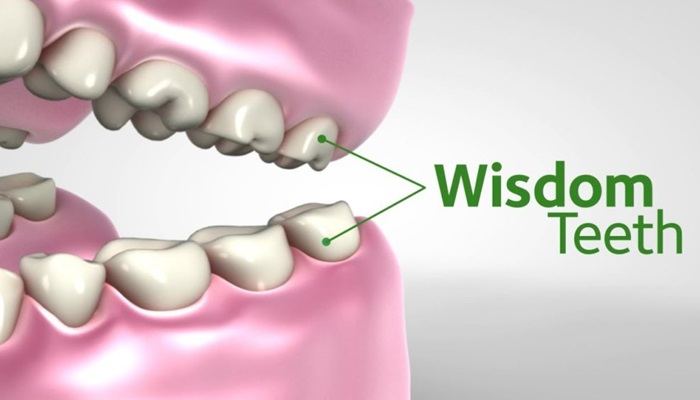When you start to feel discomfort or pain in your mouth, it may be tempting to assume that the pain is coming from your current teeth. However, the source of the pain might be your wisdom teeth, which can affect other teeth even if they aren’t the ones directly causing the discomfort. In this article, we’ll explore how wisdom teeth can cause pain in other teeth and what you can do about it.
Understanding Wisdom Teeth
Wisdom teeth, or third molars, are the last set of molars at the back of your mouth. They usually emerge between the ages of 17 and 25, but not everyone has them. Some people have them fully develop and remain healthy, while others may experience problems due to a lack of space in the mouth.
While some people have no issues with their wisdom teeth, others can develop problems that affect the entire mouth. For example, impacted wisdom teeth—teeth that don’t have enough space to emerge fully—can lead to pain not only in the area where the wisdom tooth is located but also in nearby teeth.
Can Wisdom Teeth Cause Pain in Other Teeth?
Yes, wisdom teeth can cause discomfort or pain in other teeth. Here are some ways they can affect other teeth:
1. Impacted Wisdom Teeth
When there isn’t enough space for the wisdom teeth to emerge properly, they become impacted. Impacted wisdom teeth can cause a variety of issues, including pain in neighboring teeth. Since the wisdom teeth are trapped beneath the gums, they can push against adjacent teeth, creating pressure and causing pain. This pain can spread to the second molars and even the front teeth.
2. Misalignment of Other Teeth
As wisdom teeth attempt to push through, they can cause misalignment of the surrounding teeth. The force exerted by the wisdom teeth can push on the adjacent molars, causing them to shift.
This can lead to discomfort and even longer-term alignment issues, affecting the overall bite.
3. Infection and Inflammation
If a wisdom tooth partially emerges and causes the gum to flare up, it can lead to a condition known as pericoronitis, which is an infection of the gum surrounding the tooth. This infection can spread to neighboring teeth, leading to pain in those areas as well. Red, swollen, and tender gums around the affected tooth are common signs of this condition.
4. Cavities in Adjacent Teeth
Sometimes, wisdom teeth can cause other teeth to decay due to the difficulty of properly cleaning the back molars. When a wisdom tooth is impacted or partially erupted, it can make it harder to reach the second molars with a toothbrush. This can lead to plaque buildup and cavities in the adjacent teeth, which might cause pain or sensitivity.
Symptoms That Indicate Wisdom Teeth Might Be the Cause of Your Pain
If you experience pain in your other teeth, it can be difficult to know for sure whether wisdom teeth are the culprit. Some symptoms to watch for include:
Pain in the back of the mouth: If you feel pain in your back molars or near your jaw, wisdom teeth could be putting pressure on your other teeth.
Jaw pain: When wisdom teeth push against the jawbone, it can cause discomfort in the surrounding area.
Swollen gums: If your gums are swollen and tender, this could be a sign of an issue with your wisdom teeth, especially if the discomfort spreads to other teeth.
Difficulty opening your mouth: If you’re experiencing difficulty opening your mouth or chewing, wisdom teeth might be affecting the surrounding structures.
Headaches: Pressure from wisdom teeth can radiate to the head, causing headaches or migraines.
What Should You Do If You Suspect Your Wisdom Teeth Are Causing Pain?
If you believe your wisdom teeth are causing pain in other teeth, it’s important to take action to avoid further complications. Here are some steps you can take:
1. Visit Your Dentist
The first step is to visit your dentist for an examination. They may take X-rays to check the position of your wisdom teeth and see if they are impacted or causing any issues with neighboring teeth. Depending on the situation, your dentist might recommend treatment, including wisdom tooth extraction or other methods to alleviate the pressure on your other teeth.
2. Pain Management
If you’re in pain while waiting to see your dentist, over-the-counter pain relievers, such as ibuprofen or acetaminophen, may help manage the discomfort. Cold compresses can also reduce inflammation and ease the pain in the affected area.
3. Oral Hygiene
Maintaining good oral hygiene is essential for preventing further complications. Make sure you brush and floss around the wisdom teeth area carefully to avoid plaque buildup and the development of cavities in adjacent teeth.
4. Consider Extraction
In cases where wisdom teeth are severely impacted, causing significant pain and potential damage to nearby teeth, your dentist may recommend removal. Extraction can relieve pressure on neighboring teeth and help prevent further dental issues. However, not everyone needs to have their wisdom teeth removed. Some people can keep their wisdom teeth without issues, as long as they are healthy and aligned.
When Should You Seek Immediate Attention?
If you experience any of the following symptoms, you should seek immediate dental care:
- Severe pain that doesn’t subside with over-the-counter pain relievers
- Swelling that doesn’t go down after a few days
- Difficulty swallowing or breathing
- A fever, which could indicate an infection
These symptoms could signal an infection or other complications, and immediate attention can prevent the problem from getting worse.
Conclusion
Wisdom teeth can indeed cause pain in your other teeth, whether through pressure from impacted teeth, misalignment, or infection. If you’re experiencing discomfort, it’s important to visit your dentist for an accurate diagnosis and treatment plan.
By addressing wisdom tooth problems early, you can avoid more serious issues with your other teeth and maintain a healthy, pain-free smile.

